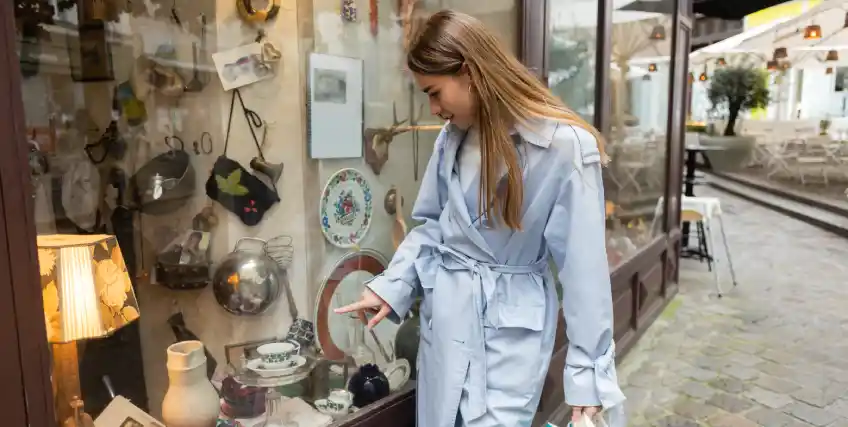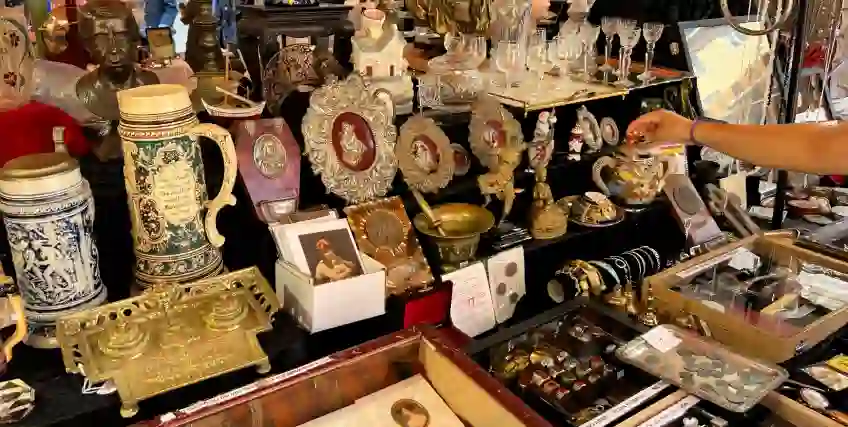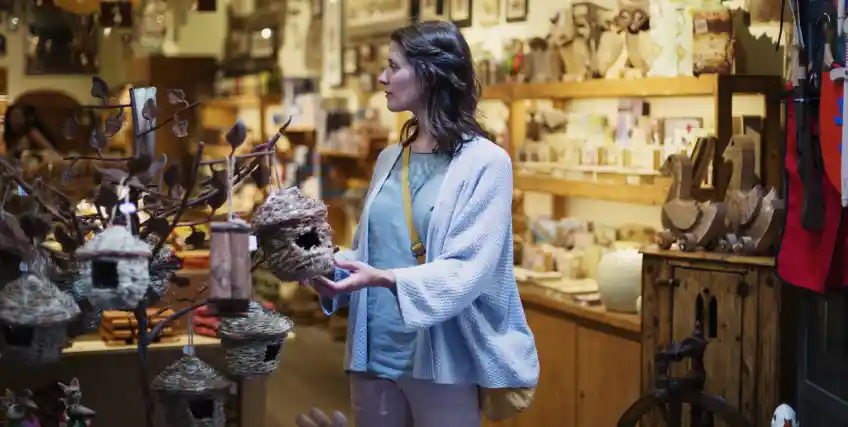Loans on Antiques: A Comprehensive Look at Your Financing Options
Sep 02, 2025 | Last Updated on: Sep 03, 2025

Opening an antique store can be a promising business opportunity. The market for unique, high-quality collectibles attracts a steady base of customers, but success requires more than a keen eye for valuable items. Securing adequate funding is critical, whether to cover startup costs, expand operations, or take advantage of time-sensitive buying opportunities. Loans on antiques and other financing options can give business owners the flexibility to manage cash flow, purchase inventory, and position their shops for growth. Understanding why to borrow, the types of loan options available, and how to choose the right lender is essential to building a financially sustainable antique store.
Why Antique Store Owners Borrow
Most antique store owners borrow for a handful of recurring reasons. These needs aren’t always predictable, and having access to financing can help a shop respond quickly without harming cash flow.
- Startup Costs: Opening a store takes more than signing a lease. You may need to renovate the space, purchase display cases, upgrade the lighting, install security, and obtain necessary licenses or insurance. The appraisal of your business plan and the expected market value of your initial inventory often help lenders decide the loan amount. Loans on antiques or other small business loan options spread these costs over time instead of draining personal savings in a single hit.
- Expansion: Growth often means more space, a second location, or building an e-commerce platform to reach customers outside your town. Even when sales are steady, expansion requires upfront spending that doesn’t pay off immediately. Financing with loans on antiques bridges the gap, especially when supported by a strong credit history and a clear repayment plan.
- Buying Inventory: Antiques are often one-of-a-kind, and the best opportunities come with little warning. Estate sales, auctions, and private collections won’t wait for you to gather funds. Antique store business loans on antiques or other collateral loan arrangements allow borrowers to act quickly when valuable items become available.
- Smoothing Cash Flow: Sales can spike during tourist season and slow in the winter. Rent, payroll, and utilities still need to be paid regardless of daily sales. Access to quick cash helps cover fixed costs when revenue dips.
Types of Traditional Business Loans
If you want to keep things predictable, traditional loans designed for antique shops are a good starting point. Banks, credit unions, and online lenders offer a variety of products that work well for antique shops. Each type of loans on antiques has its own loan terms, repayment structure, and eligibility requirements, so it’s important to match your financial situation with the right option.
Startup Loans
Startup loans on antiques are built for new businesses without a long operating history. They often come with fixed interest rates, so your monthly repayment stays the same for the duration of the loan. The amount you can borrow varies widely, from just a few thousand dollars up to around $250,000, depending on eligibility and the lender’s review of your credit history, credit score, and business plan. Many lenders focus more on your personal financial situation and projected earnings than on existing business revenue. For antique dealers, these loans are often used for renovations, securing initial collectibles, or covering operating costs until the shop becomes profitable.
Microloans
Microloans are small business loan options provided by nonprofit lenders or community-based organizations. These loans on antiques are designed for borrowers who need a modest loan amount, often under $50,000, and generally come with repayment terms of one to five years. Interest rates are usually fixed, giving you predictable payments. In some cases, lenders offer business guidance alongside funding. For antique shops, a microloan might cover the cost of appraisals, minor store upgrades, or travel to source rare pieces from auctions or estate sales.
Term Loans
A term loan provides a lump sum of cash that you repay over a set period, typically ranging from three to ten years. Interest rates may be fixed, making budgeting easier. Others have variable interest rates, which means they change with market conditions. Loan amounts can be substantial, sometimes reaching into the hundreds of thousands, depending on collateral, valuation, and the borrower’s credit profile. These loans on antiques are suitable for antique store owners planning significant investments, such as purchasing a building, constructing secure storage for valuable items, or funding a large-scale marketing campaign.
Business Lines of Credit
A business line of credit works like a credit card. You’re approved for a maximum loan amount, but you only pay interest on what you actually use. Repayment terms are often flexible, and rates are typically variable, based on credit checks and your overall financial health. For antique shops with retail loans, this type of financing is a good fit for unpredictable inventory purchases or managing cash flow during slower months. It also reduces the need for repeated loan applications when quick access to funds is required.
SBA Loan Options
SBA loans, like the SBA 7(a) and SBA Microloan programs, are backed by the Small Business Administration but issued through private lenders. Because these loans on antiques are partially guaranteed by the government, they generally come with lower interest rates and longer repayment terms than many traditional loans. For example, repayment can stretch to 10 years for working capital or up to 25 years for real estate.
With government-backed loans, borrowers may be approved with less-than-perfect credit. The trade-off is a more involved application process, detailed eligibility requirements, and a longer loan approval period. Antique shops that qualify often find SBA loans to be one of the most affordable loan options for expansions, property purchases, or large inventory investments.
Alternative Financing Options
Not every borrower qualifies for traditional loans on antiques, and sometimes speed matters more than cost. Alternative financing provides antique store owners with more flexibility when they need quick cash or have unique collateral.
Merchant Cash Advance
A merchant cash advance (MCA) is a cash advance based on projected credit card sales. Lenders provide an upfront sum, and repayment comes directly from a fixed percentage of daily card transactions.
However, the downside is cost, as effective interest rates are high and repayment is frequent. For antique shops with strong seasonal sales or an upcoming auction, this option can make sense if the potential profit outweighs the repayment pressure.
Inventory Factoring
Inventory factoring is a financing option that uses the appraised value or market value of your current inventory as collateral. The lender advances a portion of that value, typically with repayment terms ranging from three to twelve months. Interest rates for these loans on antiques vary but are often lower than those for a merchant cash advance. Loan approval depends more on the valuation of the inventory than on the borrower’s credit score. Antique dealers often use inventory factoring to free up cash flow while waiting for valuable items to sell.
Personal Loans
Personal loans rely on your personal credit score and history instead of your business’s financial track record. They can be secured or unsecured, with most offering fixed interest rates and repayment terms from one to seven years. The application process is generally straightforward, with fewer eligibility requirements than traditional small business loans, and funding can arrive quickly. For antique shop owners without established business credit, personal loans can provide the loan amount needed to cover immediate expenses. The trade-off is personal liability, as repayment falls directly on the borrower even if the shop struggles.
How to Choose the Right Lender
The lender you choose can have as much impact on your shop’s success as the loan itself. The best choice isn’t always the one with the lowest interest rates. Sometimes speed, flexibility, and experience in the antique industry are just as important.
- Compare Rates and Fees: Look beyond the base interest rate on your loans on antiques to see the total repayment amount. Some lenders add origination or processing fees that increase your cost.
- Evaluate Repayment Flexibility: Lenders differ in how they handle early repayment. Some allow it without penalties, while others charge a fee. Watch out for these added costs if you plan on paying extra to reduce your balance.
- Look for Industry Experience: Lenders familiar with antique shops understand appraisal, valuation, and collateral loan arrangements, making the application process smoother.
- Consider Funding Speed: Fast loan approval can be worth slightly higher rates if it means securing valuable items before another dealer can.
How to Improve Your Credit Before Applying
Your credit profile plays a major role in determining the loan terms you’re offered. When applying for loans on antiques, lenders will run credit checks on both personal and business accounts.
- Review Credit Reports: Identify and dispute errors that may be dragging down your score. A study by Consumer Reports found that almost half of the participants found a mistake on their credit report and more than 25% had errors big enough to impact their credit score.
- Pay Down Balances: Credit utilization is how much you owe on revolving credit, like credit cards and lines of credit. Lowering credit utilization by paying down your balances could improve your eligibility for better interest rates and loan terms.
- Limit New Credit Applications: Each hard inquiry can reduce your credit score by up to five points. The impact can last up to one year. Too many inquiries in a short time can reduce your score and make lenders think you are in financial distress.
- Build Positive Payment History: Your payment history is the largest factor in calculating your credit score. Consistent on-time repayment, even on smaller accounts, shows lenders you can manage debt responsibly.
The Bottom Line
Loans on antiques can help antique store owners do more than just cover expenses. They can create opportunities for growth, stability, and long-term success. The key is knowing why you’re borrowing, matching your financial needs to the right loan options, and working with lenders who understand the unique challenges of the antique industry. With careful planning, the right loan terms, and a clear repayment strategy, borrowing can be a tool that strengthens your business rather than straining it.
FAQ About Loans on Antiques
What are loans on antiques, and how do they work for store owners?
They are financing options that use antiques or related business assets as part of the lending decision. Some lenders specialize in evaluating collectibles and determining appraised value, while others treat it like standard retail financing.
Can I use loans on antiques to purchase inventory for my shop?
Many antique dealers borrow specifically to buy large collections or valuable items, allowing them to act quickly without harming cash flow.
Are loans on antiques a good option for startup businesses?
They can be, especially if the lender understands the antique trade. That said, startups may face stricter eligibility requirements and higher interest rates without a proven sales history.
Do loans on antiques require collateral other than the antiques themselves?
Some lenders accept antiques as collateral, while others require additional business or personal assets based on the loan amount and risk.
How do I find lenders that specialize in loans on antiques?
Look for lenders experienced in working with antique shops. Check with trade associations and network with other antique store owners for recommendations.
Frequent searches leading to this page
Related Articles
Term Loans are made by Itria Ventures LLC or Cross River Bank, Member FDIC. This is not a deposit product. California residents: Itria Ventures LLC is licensed by the Department of Financial Protection and Innovation. Loans are made or arranged pursuant to California Financing Law License # 60DBO-35839




